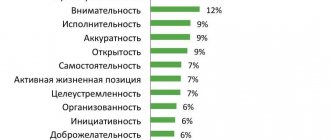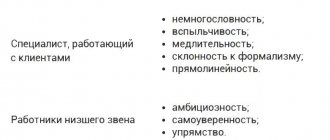Business qualities are a person’s ability to perform functions if he has a certain level of knowledge, education, work experience and personality characteristics. Without identifying and assessing them, it is difficult to entrust him with the performance of duties and count on their high-quality performance.
There are different approaches to defining business and professional qualities. Some people tend to believe that an employee’s professional qualities are the least important. The most popular position is that professionals reveal in more detail the characteristics of a specialist’s properties. Business skills are universal qualities for different types of work.
Examples of professional qualities in a resume
When writing your resume, you should pay special attention to your professional qualities. It is by them that the employer will judge whether you are suitable for the company or not. Accordingly, professional qualities for a resume need to be selected and listed very carefully in order to attract the recruiter who will communicate with you at the interview.
Content
- Professional qualities for a resume
- Examples of professional qualities in a resume
Professional qualities for a resume
Professional qualities - this is how one can characterize the totality of personal qualities, as well as all the skills that a person managed to acquire during his professional activity. They can help you improve in the future and bring tangible benefits to your company.
Sometimes there are qualities that can be called professional only conditionally. For example, if an applicant describes a “developed sense of humor” as one of them, they are unlikely to attract the recruiter’s attention. Unless a person is looking for a job as a party host - then the sense of humor can still be called professional.
How to get an effective resume with a favorable description of your professional qualities?
We offer professional assistance to job seekers who want to take their job search seriously and get quality results.
We recommend ordering a resume writing service in Russian or English. Our specialists will help you create a truly competitive resume with the right accents.
Strong professional qualities for a resume
- desire for professional growth;
- ability to persuade;
- increased performance;
- analytical thinking.
All this will allow the recruiter to get his bearings and understand how to communicate with you and what qualities of yours to best try to reveal during an interview.
For example, the same lack of experience can be complemented by such qualities as result orientation and quick learning. Thus, the employer, realizing that one cannot expect instant results from a new employee, still gets the opportunity to create from him exactly the kind of specialist that is required. If your future employer is forward-thinking, you have a good chance.
Examples of professional qualities in a resume
It must be remembered that when listing any of the professional qualities, you need to coordinate this list with the requirements for the position. For example, accuracy can hardly be considered a professional quality and defining criteria for a candidate applying for a top manager position. But it can turn out to be a very tangible advantage for the position of secretary. Therefore, when choosing professional qualities for your resume, consider how relevant one or another of them will be for you in a future position.
Here are a few situations related to certain professions that require certain specific qualities.
Example of professional qualities for a manager's resume
- responsibility;
- performance;
- ability to negotiate;
- enterprise;
- ability to make quick decisions.
Example of professional qualities for an accountant resume
- diligence;
- accuracy;
- punctuality;
- organization.
Example of professional qualities for a sales manager resume
- the ability to find a common language with people;
- public speaking skills;
- ability to quickly navigate a situation;
- creativity.
As you can see, the difference in professional qualities is obvious. It all depends on what vacancy you intend to apply for. But do not forget that the list of qualities should not be too long. If it contains about 10 points (or even more), then there is a high probability that your resume will be put aside: after all, the recruiter will get the feeling that you are simply praising yourself. Show moderation and the recruiter will appreciate your professional qualities in your resume.
Business qualities: what to look for when selecting
An employee’s business qualities are the ability to perform job duties as specified in the job description. When choosing an employee, focus on the benefit he will bring to the organization. Take into account personal qualities - they characterize your attitude towards work.
Business and personal qualities of an employee: list
| Business qualities |
|
| Personal qualities |
|
| Important! The table lists a person's business qualities that can be used for a resume or job description. Only part of them will be enough for work. Keep in mind that a person cannot be endowed with all of them at the same time. |
A person’s business qualities directly depend on his personal ones—they are closely interrelated. When selecting a candidate for a vacant position, make a list of required and non-essential abilities and traits.
If an applicant has entered more than 5 characteristics into his resume, this means that he is not able to make a choice. The standard “punctuality”, “efficiency”, “responsibility” have become banal, so ask what the employee means by them.
Pay attention to such business qualities of the employee as “motivation to work”, “self-control”, “professionalism”. Job seekers often embellish skills and abilities.
To ensure the integrity of the information, ask for an illustration of the specified characteristics. Weed out people who voice contradictory qualities immediately.
If they are unable to decide on the characteristics, do not expect high performance from them.
| Business and personal qualities in a resume: example A specialist got a job in an organization, who wrote in his resume that he is distinguished by high efficiency and activity. The manager expected the employee to be willing to work overtime, but it turned out that by this he meant the ability to perform several tasks at the same time. |
Negative personal and business qualities of a manager
Ask applicants to include negative business qualities on their resumes, but don't expect honesty. Be lenient if the candidate does decide to fill out the column. Some of the negative characteristics help in work.
Negative business qualities of a person: list
- hyperactivity, restlessness;
- excessive emotionality, touchiness;
- greed, impudence;
- addiction to gossip;
- vindictiveness;
- inability to lie, straightforwardness;
- inability to work in a team;
- lack of work experience or education;
- lack of sense of humor;
- bad habits;
- self-confidence;
- modesty, shyness;
- poor communication skills, conflict.
An applicant who has entered negative business qualities of a person is honest and rash at the same time. If you want to know possible problems with it, ask to list them and give examples of when they appeared. Give the person the opportunity to present negative traits in a favorable light, listen to him. They often help with work and career advancement.
Projective questions for assessing an applicant for the position of head of the event organization department
Professional and business qualities of workers in various fields
Be careful when assessing an employee’s professional and business qualities. Don’t hire the first person you come across to fill the vacancy faster. You should believe the information in your resume, but it should be verified.
Required qualities:
- For employees in the field of promotion: communication skills, sociability, ability to work in a team, charm, energy, self-confidence.
- In the field of trade: skills of interaction with clients, flexibility of thinking, ability to negotiate, quick response, politeness, activity.
- Personal and business qualities of a leader: organizational skills, ability to find a common language and work in a team, lack of conflict, resourcefulness. Charm, quick decision-making, attentiveness, and balance are valued.
- Strengths of a specialist working with large volumes of data: attention to detail, quick learner, accuracy, organization.
- Professional, personal and business qualities of secretaries: business communication skills and interaction with clients, literacy, negotiation skills, business correspondence, the ability to perform several tasks at the same time. External data, tact, and balance are important.
Responsibility, stress resistance and attentiveness are useful in any field of activity. But the candidate, when writing these qualities into his resume, does not always take them seriously. Some people don't understand what they mean. They notice who is wearing what, but they lose sight of important nuances in work, do not respond to criticism, and confuse responsibility with performance.
list of professional and personal qualities of an employee (video)
October 28, 2015
What might an employee’s business qualities be, a list that should be followed? The list of them is of course large and varied. Currently, it is up to the employer to evaluate the actions of any employee, his level of professionalism, strengths and business qualities. This becomes a perfect task, helping to form an efficient team and significantly increase labor efficiency. But from the side of the employee himself, their list helps not only to create a competent resume sent when looking for a job, but also increases the chances of other potential applicants in the employment process.
The personal qualities of employees can be divided into 2 large categories: personal, which are initially innate and develop during the development stages of the person himself, and professional, which are acquired in the process of work and come with experience. A skillful combination of both, and constant work on oneself, provide a unique opportunity for career growth and good management. Let's look at these categories in more detail.
Professional qualities of the employee
Of course, in its standard understanding, this list can be huge, and the criteria that a manager uses when assessing a particular employee can differ significantly depending on the positions held, the functionality assigned to the employees, and the tasks assigned to them.
But let’s try to collect their frequently occurring positions into a single list.
- Self confidence. This is an acquired quality that gives a clear awareness of the impeccable performance of one’s functions and a kind of basis for further decision-making.
- Excellent knowledge of the features and technology of work, ways to improve it. It is developed with incoming experience and thanks to one’s own interest in the relevance of production changes.
- The ability to choose the right means and real methods for achieving the best results.
- Creativity. Defining an updated approach to an established production process and the opportunity to look at it from a different, non-standard perspective.
- Stress resistance. This is the ability to show restraint in one’s own reaction in relation to the situation or actions of employees.
- Planning your own work process in relation to efficiency and combining it with the work of the entire team.
- Emotional balance. Lack of a strong reaction to what is happening and regular maintenance of calm in conflict issues. It is developed over time in the stability of emerging situations.
- The desire to win. Regular desire to achieve the best performance in relation to other employees occupying the same positions in the organization.
- Distribution of powers and responsibilities. The ability to determine the priority of assigned tasks and delegate some powers to the team with their subsequent control.
- Clear and tough solutions to operational issues. In the process of well-established work, non-standard situations arise that require timely identification and resolution, and here only actual actions are necessary.
- Strictness and fairness towards one’s own actions and those of others. Abilities that enable you to evaluate work results.
- Organization of personnel work. The ability to professionally organize the process of activity so that each employee clearly understands their tasks and strives for their effective implementation.
Personal qualities of employees
These are aspects of human life that are formed individually, developing every year. They affect not only relationships in the family, everyday life and friendly contacts, but also work processes.
- Skill to work in team. Of course, this is very important when the team, as a whole, is determined to achieve results, to organize its work without conflicts and in a pleasant positive way with the rest of the employees.
- Justice and honesty. This is the key to the right attitude and the opportunity to demand the same attitude towards yourself.
- The ability to listen to other people’s opinions, accept advice and recommendations. You need to understand that the decision made may not always be the only true and correct one, and an outside perspective is sometimes able to most effectively assess the situation. It is important to simply accept such help.
- Adequate perception of criticism from outside. Do not think that the criticizing person is completely negative towards you. Perhaps this is simply a method to show real performance results and improve their level. Such criticism mostly brings positive results.
- Ability to defend your decisions and interests. In industrial disputes, based on evidence and facts, it is important to correctly convey performance indicators
- Integrity. This is a quality that helps you defend your own point of view.
- The ability to keep your word. This position convinces of responsibility and the opportunity to rely on your candidacy, confirming once again that you are a good employee.
- Showing tact. This is the ability with which it is possible to build better relationships in a team.
- Determination and perseverance. Such innate qualities allow you to defend your own position and convince management of the correctness of your decisions.
The assessment of the business qualities of employees for the first time occurs when hiring. It is here, during the interview process, that the head of the organization considers your candidacy positionally, mentally applying these qualities in relation to the future functionality of the job. And a little later, by conducting regular certifications, it helps to assess the suitability of abilities for the position held. During the assessment process, a number of other main tasks are solved:
- the most relevant place in the organizational structure is determined for more effective use of the strengths of the future employee;
- if necessary, develops an individual development program for employees;
- ways of possible motivation are determined;
- The satisfaction of personnel from their duties is considered.
On the one hand, such a process helps to actively collect all the necessary information to study the employee’s level of professionalism and the possible organization of his training, and on the other hand, it increases his motivation and develops the basis for future material incentives.
There are several stages of business assessment of personnel:
- collection of preliminary information about the activities and results of an employee’s labor in production;
- drawing up basic questions for an assessment conversation with an employee;
- conducting an interview and evaluating the responses received to the assessment questions asked;
- formation of an expert-level opinion and transfer of data to a special commission;
- making individual decisions on proposals put forward.
The business qualities of employees, and the ability to effectively evaluate them, help to set up the work process of the entire team, establish a comfortable environment and, most importantly, significantly increase the production indicators of not only the department, but also the organization as a whole.
Table of strengths and weaknesses
We have collected some character traits in the form of a table. It will help you determine how to list strengths and weaknesses in your resume.
| Strong | Weak |
| Tenacious and results-oriented | Too shy |
| Hardworking | You don't have willpower |
| Confident | Overly emotional, irritable and even aggressive |
| Sociable | You don’t know how to keep silent in time |
| Organized and independent | Hyperactive |
| Easily perceive new information and can work with large volumes of information | Are you afraid to travel on ships and aircraft? |
| Learn quickly | Principled |
| Responsible for their own actions and the actions of subordinate employees | You don't know how to be flexible |
| Disciplined | Overly self-critical |
| Active, energetic | Straightforward |
| Have organizational skills | Too proud |
| Punctual | Impulsive |
| Developed creative thinking | Supporter of formalism |
Match your strengths with those personality characteristics that will help you get the job you want. Please note that some of them, which seem like an advantage to you, may turn out to be a disadvantage for the applicant.
Read more - What weaknesses can be written in a resume?
Professional qualities for a resume
Professional qualities - this is how one can characterize the totality of personal qualities, as well as all the skills that a person managed to acquire during his professional activity. They can help you improve in the future and bring tangible benefits to your company.
Sometimes there are qualities that can be called professional only conditionally. For example, if an applicant describes a “developed sense of humor” as one of them, they are unlikely to attract the recruiter’s attention. Unless a person is looking for a job as a party host - then the sense of humor can still be called professional.
Strong professional qualities for a resume
- desire for professional growth;
- ability to persuade;
- increased performance;
- analytical thinking.
All this will allow the recruiter to get his bearings and understand how to communicate with you and what qualities of yours to best try to reveal during an interview.
For example, the same lack of experience can be complemented by such qualities as result orientation and quick learning. Thus, the employer, realizing that one cannot expect instant results from a new employee, still gets the opportunity to create from him exactly the kind of specialist that is required. If your future employer is forward-thinking, you have a good chance.
Negative qualities of an employee
Sometimes job applicants also include them in their resume. In particular such as:
- Hyperactivity.
- Excessive emotionality.
- Greed.
- Vengefulness.
- Impudence.
- Inability to lie.
- Inability to work in a team.
- Restlessness.
- Touchiness.
- Lack of work experience/education.
- Lack of a sense of humor.
- Bad habits.
- Addiction to gossip.
- Straightforwardness.
- Self-confidence.
- Modesty.
- Poor communication skills.
- The desire to create conflict.
An applicant who includes negative qualities in his resume may be honest, or he may be reckless. Such an action does not justify itself, but if you want to know possible problems with this applicant, ask him to list his negative qualities. Be prepared to give the person the opportunity to rehabilitate himself and present negative qualities in a favorable light. For example, restlessness indicates easy adaptation and quick switching from one task to another, and straightforwardness indicates the benefits that it can bring when concluding a deal.
Be prepared to give the person the opportunity to rehabilitate himself and present negative qualities in a favorable light.
Examples of professional qualities in a resume
It must be remembered that when listing any of the professional qualities, you need to coordinate this list with the requirements for the position. For example, accuracy can hardly be considered a professional quality and defining criteria for a candidate applying for a top manager position. But it can turn out to be a very tangible advantage for the position of secretary. Therefore, when choosing professional qualities for your resume, consider how relevant one or another of them will be for you in a future position.
Here are a few situations related to certain professions that require certain specific qualities.
Example of professional qualities for a manager's resume
- responsibility;
- performance;
- ability to negotiate;
- enterprise;
- ability to make quick decisions.
Example of professional qualities for an accountant resume
- diligence;
- accuracy;
- punctuality;
- organization.
Example of professional qualities for a sales manager resume
- the ability to find a common language with people;
- public speaking skills;
- ability to quickly navigate a situation;
- creativity.
As you can see, the difference in professional qualities is obvious. It all depends on what vacancy you intend to apply for. But do not forget that the list of qualities should not be too long. If it contains about 10 points (or even more), then there is a high probability that your resume will be put aside: after all, the recruiter will get the feeling that you are simply praising yourself. Show moderation and the recruiter will appreciate your professional qualities in your resume.
Small video recommendations on writing a resume and passing interviews
How to write a resume for a job
How to pass a job interview
You may also be interested
What negative qualities can be indicated in a resume: instructions and examples for applicants.
What personal qualities to include in a resume: universal rules and examples for applicants.
The correct resume form for applying for a job in English: download in WORD or PDF.
What positive personal qualities to include in your resume: recommendations and examples for applicants.
The correct resume form for applying for a job in Russian: download in WORD or PDF.
Writing examples
Let's look at an example of professional skills for a PR manager resume:
- experience in PR promotion (more than 8 years of work, there are connections in major media);
- knowledge of advertising and promotion on the Internet (experience in developing Internet projects from scratch);
- experience in negotiations and sales skills (more than 8 years);
- high level of PC skills;
- I can explain simply (set tasks, make presentations, teach);
- I speak in public easily.
Let us repeat: in addition to the general ones, suitable for most potential vacancies, there are also specific, additional skills; For a resume, a combination of both is important.
Use our table when preparing a self-presentation while looking for a job.
Examples of professional skills and knowledge in a resume:
| Leadership skills for managers | |
| Manager |
|
| Manager |
|
| Director |
|
| Head of Sales Department |
|
| Key skills for administrators and secretaries | |
| Administrator |
|
| Secretary |
|
| Key skills and abilities for sellers, consultants | |
| Consultant |
|
| Salesman-cashier |
|
| Key skills and abilities for teachers leading seminars and trainings | |
| Teacher |
|
| Presenter at seminars and trainings |
|
| Key skills and abilities for technical specialists: programmers, system administrators | |
| Programmer |
|
| System Administrator |
|
| Key skills and abilities for accountants, auditors | |
| Accountant |
|
| Auditor |
|
| Key skills and abilities - examples for lawyers | |
| Lawyer |
|
| Key skills and abilities for a resume, example for an HR director | |
| HR Director |
|
| Key skills for drivers | |
| Driver |
|
IMPORTANT!
Don’t be tempted to find and copy a ready-made template; be sure to rework the application to suit you and the specific vacancy. That among them there are relatively universal ones is an illusion. Finding a standard sample (as an example) of what key skills to include in a manager’s resume and rewriting them for an administrator, sales representative or salesperson is not an option. Of course, the administrator is not a criminal lawyer or a neurosurgeon, but he is not a sales consultant either. Plus, impersonal, many times copied questionnaires are more likely to end up in the trash before being read.
Example of a completed resume:
Professional qualities for writing a successful resume
Today, to get a job, you just need to send your resume by email. The part where the professional qualities of the individual will be specified is one of the most important for the employer; thanks to the list of characteristics, you can learn a lot about a person without communicating with him.
An employer will understand a lot about a person by reading a list of his professional qualities
An old look with a new twist
For a long time there was a contrast between a person’s professional and personal qualities. They were at different poles. What distinguished people of one profession from workers of another was considered professional qualities. This view is somewhat outdated.
In the business environment there is no longer a division between the individual and the professional. A unification has taken place. Now professional and personal qualities exist in conjunction with each other. Let's talk about this in more detail
How to present yourself correctly
When compiling a list of qualities of an employee of an organization, it is necessary to list and explain:
- Personal qualities of a person. These are the characteristics that appeared during his socialization.
- Business qualities of the employee. These are the characteristics that describe a person as a potential specialist.
- Key skills. You need to point out the skills acquired at school, university or while working in another company that will help you cope with tasks in a new place.
When compiling this list, there is no need to deviate from the main goal of the resume - further employment in a prestigious organization. You should not list those personal qualities that you do not possess. The deception will be revealed quickly, but the feeling of shame will remain for a long time.
Helpful tips on how to better understand your strengths and weaknesses
It's never easy to talk about your weaknesses. Therefore, when writing a resume and at an interview, it is better to answer this question by avoiding the following points:
- hide personal qualities that are unfavorable for yourself, for example, low self-esteem, hot temper, lack of self-confidence, inattention, etc.;
- the weakness should not concern professional competence.
Let this be a fairly minor negative characteristic that is not capable of influencing the decision to refuse the desired position. Carefully study the requirements for the vacancy and do not indicate everything related to the qualities and skills required for the job.
In general, when creating a resume, it is recommended to indicate universal strengths.
For example, always set goals and strive to achieve them.
This will show you as a goal-oriented person, ready to plan and achieve. Self-confidence will also have a positive effect on your grade and will speak of you as a person who is not afraid to move forward.
The ability to communicate with colleagues and clients (if the work involves communications) and responsibility are also important. Rather, these are the most necessary traits for any employee.
What to write about in your resume
Many people think that a cheerful person will join the team faster. A good sense of humor can help with informal communication with colleagues, but such a characteristic will not give the desired result unless you are applying for a job as a toastmaster or animator. What professionally important personality qualities should be indicated in a resume:
- If you want to emphasize that you are ready to work hard, then it is worth pointing out the desire to develop, the presence of increased efficiency, the desire for career growth, and resistance to stress.
- If you want to indicate the presence of leadership potential, then the following phrases will help: the ability to distribute powers and responsibilities, responsible, have negotiation skills, have the ability to quickly navigate a situation and get out of it.
- If you are attracted to a position where deep knowledge and good mental abilities are required, then you need to write about entrepreneurship, the ability to quickly solve problems, accuracy, organization, and analytical thinking.
- If the vacancy requires frequent public speaking, then it is necessary to declare such useful qualities as emotional balance, the ability to control oneself even in front of a large crowd of people, the ability to find a common language with people, self-confidence, and oratorical abilities.
- If in the process of work you need to show creative abilities, then it won’t hurt to talk about the presence of creative thinking, a non-standard approach to standard things.
Creativity is essential for creative work
Strengths and weaknesses relative to the position
Each position has its own set of personality aspects that the employer pays attention to. It is very important to strike the balance that will make you the ideal candidate for the position.
Tables of strengths and weaknesses for each profession:
| Strong | Weak |
| Salesman | |
|
|
| Supervisor | |
|
|
| Manager | |
|
|
| Accountant | |
|
|
Read more - What can you write about strengths in your resume?
Useful tips
- In addition to the typical useful qualities of a real professional, it is worth pointing out characteristics that could replace the lack of something in a potential specialist. If you have no experience in a certain area, then you should point out the ability to grasp everything on the fly and learn quickly.
- Before including this or that characteristic, you should think and soberly evaluate yourself. To confirm or refute the presence of a particular personal quality, you need to give an example of a life situation.
- When writing a resume, you need to rely on those characteristics that are necessary when working in this position. If an employee will be entrusted with managing a team or a project, and he has managerial skills, then you need to focus on this.
The teacher is always right
A manager is not only a director in a company or large enterprise. The teacher also has this status. He also leads a team, but a special one, for children. This is sometimes more difficult than working with adults.
When working with children, the professional and personal qualities of a teacher are especially important. He is responsible not only for himself, but also for his students.
Here it is necessary to take into account both the professional requirements for the teacher as a specialist in a particular subject, and human qualities. Love for people, and especially for children, is one of the main things. Understanding the child’s problems, his mental state, empathy, tact, respect for his opinion and real help are the professional and personal qualities of a teacher.
Any children's, teenage, or youth group presents many surprises. Children are active, mobile, stubborn. The teacher’s task is not to lose his temper, to be able to restrain his negative emotions, and to remember tact when dealing with difficult children.
The teacher’s fairness is very important when dealing with children’s pranks and conflicts. Subjectivism and bias are unacceptable!
A teacher is an organizer in the lives of schoolchildren and students, an active personality, a creative person. He is always ahead. You want to follow him, imitate his words and actions.
A teacher must be competent in many areas and constantly improve his level, both subject and cultural.











